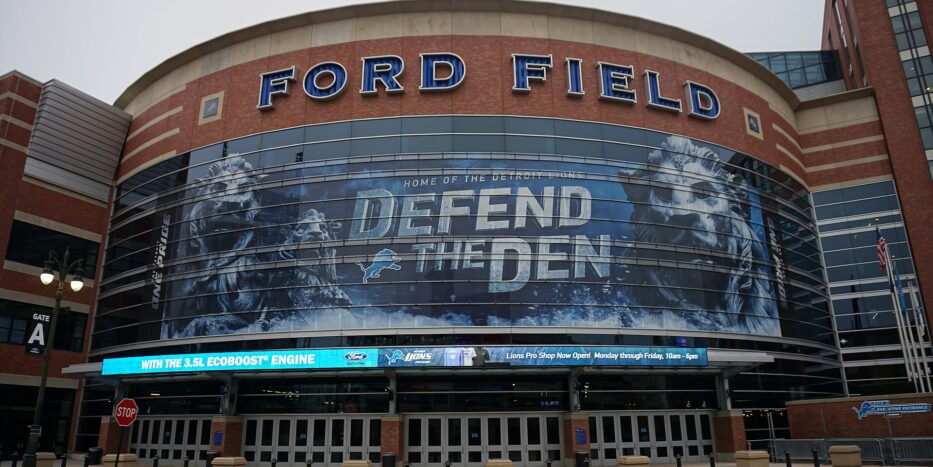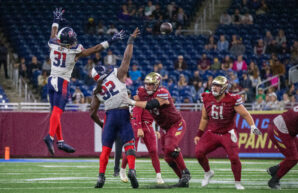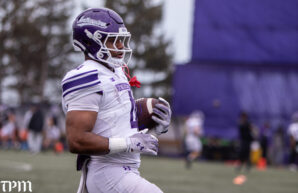With the 2024 NFL Combine now in the rearview, scouts, front offices and fans alike are armed with new intel on this year’s prospects as we draw closer to the draft next month.
This year, the event will make its Motor City debut, serendipitously descending on Campus Martius Park and Hart Plaza after a landmark season for the Detroit Lions. In the NFC Championship, the Lions claimed a 17-point halftime lead in San Francisco, but ultimately fell short of reaching the Super Bowl with a 34-31 loss to the 49ers.
For some fans, it’s still hard to grapple with the sting of coming that close to the franchise’s first Super Bowl. But what’s undeniable is that three years into the rebuild led by head coach Dan Campbell, general manager Brad Holmes, and owner Sheila Ford Hamp – all debutants in their respective roles, what started out with the misfortune and mockery that Lions fans have known far too well, eventually grew into cautious-but-steady optimism (Hard Knocks helped, too). Then last season started, and the optimism had grown into expectation. Those expectations were met with Detroit claiming their first-ever NFC North title, a 12-5 record, and their first appearance in a conference title game since the ’91-’92 season.
At last week’s combine, the Lions were recognized by Inside The League with the “Best Draft Award” for their 2023 class – which boasts the likes of Jahmyr Gibbs, Sam LaPorta, Brian Branch and Jack Campbell. It’s a nice accolade that pairs well next to Holmes’ “General Manager of the Year” award from the PFWA. Meanwhile, Dan Campbell would be 1 of 3 head coaches to receive an “A+” grade on the 2024 NFLPA Annual Report Card, which is voted on by the players in their respective locker rooms.
Then factor in the fact that, seemingly miraculously, Detroit has managed to retain both of their lead coordinators (Ben Johnson, Aaron Glenn) when they were each considered high ranking candidates on the head coaching market. And while the Lions are on the verge of handing out lucrative contracts to some of the cornerstone pieces of their newly rebuilt engine (St. Brown, Goff, Sewell), this roster is expected to retain virtually all of its premier talent while ranking in the top quarter of the league in cap space.
It’s no longer just optimism. Heck, even saying that this is a team that has real expectations feels like an undersell. We’ve reached a place where, both inside the confines of Southeast Michigan and beyond, people are becoming confident that the Lions are a team that will be competing in January — and possibly February.
That turnaround started with getting the right leadership in pivotal positions within the organization, both off and on the field. For the latter, Holmes has been far from cagey about the franchise’s philosophy towards the evaluation process.
“We have to get past just looking for the most talented player. In my opinion, that’s the prerequisite of evaluation: Who’s the fastest? Who’s the strongest? Who’s got the most height? That’s a very coherent thing to do. No, it’s, how do you find the right intangibles in a football player? And that’s what’s made us who we are.”
To put it a different way, you can safely infer that Detroit’s first benchmark in talent evaluation is identifying players who fit their operating system. That might sound basic, but stop and think about all the first dates you’ve been on in your life. I’m sure most of us wish we had Brad Holmes’s batting average as an evaluator these days.
My point being, it takes fortitude to be unwavering in your core values. And, up to this point, Holmes and the Lions have remained true to their word on that front.
While Ben Johnson and Aaron Glenn are returning in the roles leading the offensive and defensive units, Detroit has brought in new assistant coaches. The Lions welcomed Terrell Williams (defensive line) and Deshea Townsend (defensive backs) during the offseason. With cornerback being a hot topic of conversation, both in the draft and free agency, it’s worth noting what Townsend had to say to beat writers at the combine.
“If you won’t tackle, you won’t play. That’s it. If it’s on the tape you won’t tackle, you can’t play. Ultimately, I’m just looking for guys that don’t shy away from contact, that’s willing to throw it there. Then, the other part for us, how close can you get in coverage? After that, it’s building the technique from there. How can I help them? Other than that, if you won’t tackle, I’m not going to like that.”
Two of the leading names to be drafted by Detroit at pick 29 are a pair of Missouri Tigers: Ennis Rakestraw Jr. and Darius Robinson. Rakestraw has been bookmarked as a fit for the Lions’ struggling secondary since the offseason began. The reason? He’s a savvy, physical player with great footwork. Rakestraw’s biggest limitation is his long speed. He posted a 4.54 40-time with ‘average’ size and height measurements, which limits the schemes you can insert him into. But in the run game and zone? The production and consistency shine.
Robinson on the other hand is far from average in his measurements. Born and raised in Southfield, MI, Darius offers versatility as a prospect who could end up playing either interior D-line or on the edge, where he transitioned to during his time playing at Mizzou. Robinson is a 6’5, 286lb wrecking ball that, once again, thrives on physicality. Some scouts might scoff at a player who ran just under 5 seconds on the 40 playing on the outside, but paired opposite to the explosiveness of an Aidan Hutchinson or bulked up and put on the line next to a powerful interior player like Alim McNeil – it’s less of a question of if, but rather where the Lions would get the best out of the hometown kid.
One player that could fall into Detroit’s lap without trading up is Alabama corner Kool-Aid McKinstry. Once viewed as a lock for the top 15 picks, the All-American didn’t participate at the combine after the medical staff discovered that he had a Jones fracture in his right foot during his physical. It’s expected that he’ll be ready to go for training camp, but if a team like the Lions don’t take fall head-over-heels for his tape (which they very well may have already), it’s possible that McKinstry falls out of the first round.
If there’s one name that is streaking up mock draft boards for the Lions towards the end of the first round, it’s Penn State edge rusher Chop Robinson. Similar to McKinstry, Chop was once viewed as a top half of the first-round prospect, but his measurement and frame leave something to be desired of a key weapon that will be unleashed against O-lines at the NFL level. His collegiate career showed a player who is efficient, high on talent, and fast – so it comes as no surprised that his testing at the combine reflected those same attributes as well. He’s not the run-stopper that Detroit would get with the other Robinson, but Chop’s freakish traits and 4.48 40-time shouldn’t be overlooked.
Whoever the Lions take off the board on Day 1 of the 2024 NFL Draft, fans have every reason to expect that their squad has done its due diligence in the vetting process to acquire high-character, dependable players. As Holmes would put it, that’s just the prerequisite of Detroit’s new winning ways.




